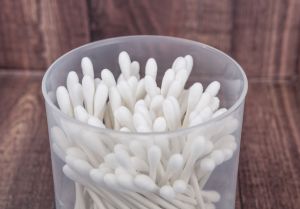Cotton swabs may seem harmless enough, but they can be dangerous when used to clean your ears. Although some people swear by using cotton swabs (Q-Tips™) to remove excess earwax and debris from their ear canals, medical experts will warn you not to try it.
Why is it bad to use Q-Tips in your ears?
Doctors and hearing care specialists have seen many catastrophes resulting from using cotton swabs. From punctured eardrums to super impacted wax, there are many negative consequences associated with “do-it-yourself” ear cleaning.

don’t use them to clean your ears.
There are several items that people use to clean their ears. Some of the most interesting seen in doctors’ offices include:
- Cotton swabs (Q-Tips)
- Hair pins
- Tweezers
- Pens and pencils
- Straws
- Paper clips
- Toys
While this is only a partial list, it’s important to realize nothing should be placed inside the ear to remove dirt and debris. This is dangerous and could cause hearing loss or a damaged ear canal or eardrum.
The ear canal has specialized cells that produce cerumen, commonly known as ear wax. Ear wax accumulates much faster for some people than others. This can lead to wax build-up that causes decreased ability to hear and in some instances, pain. As an easy way to avoid seeing a medical professional, many folks resort to using swabs to remove the excess wax, causing more harm than good.
Ear drums are fragile
The eardrum is easily reached with a swab. Because the eardrum is so delicate, it can be easily ruptured by using even the gentlest pressure when using a swab. Ask anyone who has experienced a punctured eardrum—it isn’t a pleasant experience. The pain is severe and the ear may also leak a clear fluid. While a punctured eardrum will heal, it can take a while and can even lead to conductive hearing loss.
If you damage your ears or puncture an eardrum
If you’ve been poking around in your ear and develop sudden pain, fluid leakage, tinnitus or hearing loss, see a doctor. You may have perforated your eardrum, which can become infected or heal improperly.
How to clean your ears without a Q-tip or cotton swab
The outer ear, also known as the pinna, benefits from a good cleaning every now and then. This can be accomplished with a little soap, water and a washcloth while you shower. Be gentle.
In most cases, the ear canal does not need to be cleaned. During hair washing or showers, enough water enters the ear canal to loosen the wax that has accumulated. Additionally, the skin in your ear canal naturally grows in an outward, spiral pattern. As it sloughs off, ear wax goes with it. Most of the time the wax will loosen and fall out on its own while you are asleep. The need for a cotton swab isn’t necessary.
When should you see a doctor about earwax?
For those who have heavy wax build-up, a trip to the doctor may be needed. Doctors can easily remove ear wax with a little peroxide mixed with water and injected into the ear. The process is virtually painless and is effective at removing impacted wax. If excess wax become a frequent problem, ask your physician how you can do the procedure yourself at home.
If you are experiencing significant wax build up in your ear canals, or if you think wax could be affecting your hearing, contact a hearing healthcare professional. They can look inside your ear using an otoscope, assess the situation and determine the best course of action.
